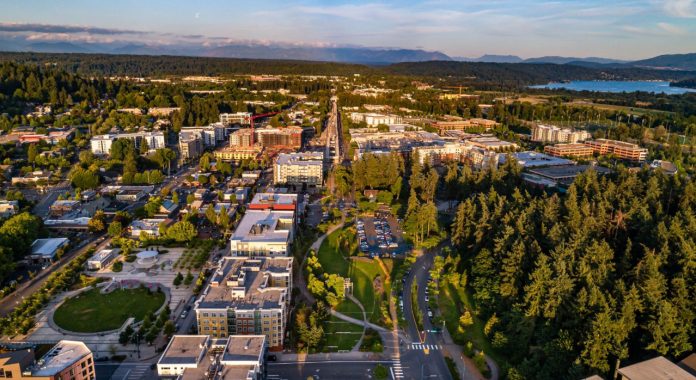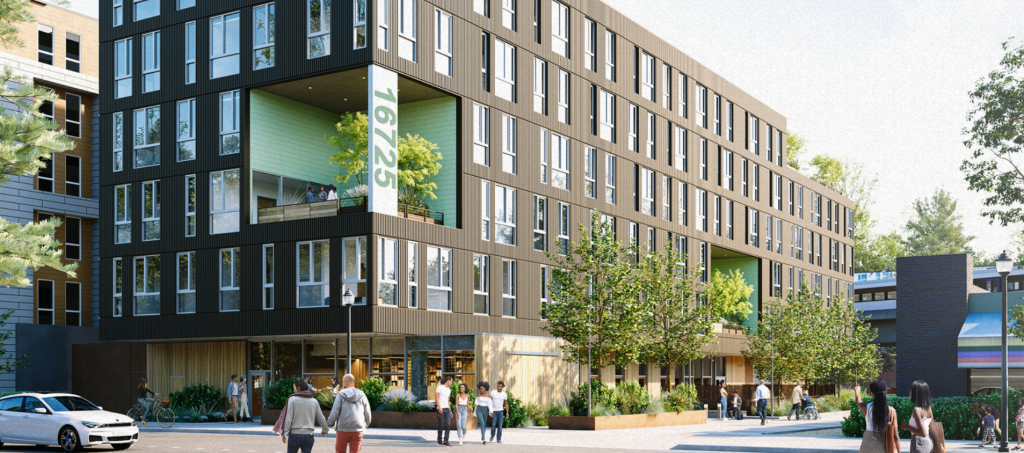
The group “Safe Eastside” has filed two separate referendum petitions targeting twin pillars of housing reform approved during the Washington State Legislature’s 2025 session. The petitions seek to repeal the Parking Reform and Modernization Act (Senate Bill 5184) and the transit-oriented development (TOD) law that is set to require cities make way for apartment buildings and condos near major transit stations.
Safe Eastside has 90 days from the end of the legislative session to turn in enough signatures to make it onto this fall’s general election ballot, giving them a deadline of July 26.
The two targeted laws were a part of a broad slate of housing reforms passed in 2025, which lawmakers have dubbed as the “Year of Housing 2.0.” Once phased in, the Parking Reform and Modernization Act will bar medium and large-sized cities in Washington from requiring more than one off-street parking stall for every two units in an apartment building — and it will prohibit parking mandates altogether in the case of affordable housing, among other select uses.
The TOD law (which passed as House Bill 1491) will require local governments to rezone areas within a half-mile of light rail and commuter rail stations, and within a quarter-mile of bus rapid transit stations. TOD requirements kick in as part of the next scheduled update to their respective comprehensive plans, which chart out growth for decades to come.
Both policies were top priorities for Democrats in the legislature in 2025, intended to make a dent in the state’s acute housing affordability crisis. They featured prominently in Governor Bob Ferguson’s transition report on housing, which claimed that “no single housing policy” would be as effective for allowing housing construction as a transit-oriented development bill.
A referendum hasn’t qualified to make it onto the statewide ballot in Washington since 2020, when voters rejected R-90, which would have pulled back requirements for schools to develop sex education curricula. To get their referenda on the ballot, Safe Eastside would need to secure the signatures of nearly 155,000 registered voters — half the number required to get an initiative on the ballot.
Formed in 2021 as a political action committee, Safe Eastside‘s advocacy has mostly focused on opposing housing for people exiting homelessness in the Redmond and Kirkland area. Its first campaign targeted King County’s conversion of the Redmond Silver Cloud Inn for permanent supportive housing (PSH) as part of the Health Through Housing program.
Most recently, Safe Eastside has targeted plans for a new Plymouth Housing PSH building on city-owned land in Downtown Redmond, a project Redmond took over after it was rejected by the Kenmore City Council.

In addition to opposing the Plymouth project, Safe Eastside has called for the resignation of Redmond Council President Vanessa Kritzer for supporting it, and for the city to explore eliminating the separately elected position of Redmond Mayor. The group has also supported slates of right-wing candidates in recent election cycles, including Dave Reichert for Governor, Raul Garcia for US Senate, and the full slate of initiatives proposed by hedge fund manager Brian Heywood in 2024.
Safe Eastside has blasted the Plymouth project as targeting the “unstable type of homeless people” and Plymouth itself as a “wealthy NGO that gives pipes and needles to its tenants.” But permanent supportive housing projects, a type of response being scaled up in response to the region-wide homelessness crisis, has proven more successful than traditional shelter interventions. New data from King County’s Health Through Housing program showed that 95% of residents who end up housed in PSH were still housed a year later, compared to 58% at shelters.
You may be wondering, what’s the tie between parking reform and the Plymouth project? Redmond’s land use code initially would have required that Plymouth find room for 125 parking stalls, despite the fact that the residents in the building would be directly exiting homelessness, with a high proportion of people with disabilities, most of which do not own cars. The building is also located steps from Downtown Redmond’s new light rail station. The City approved a variance to allow the project to move forward with just four off-street parking stalls, but three individuals have filed appeals contesting that decision — including Nicholas Strathy, a Safe Eastside donor who is sponsoring the two referenda.
Those appeals are still active, with a July 2 hearing scheduled at Redmond’s Hearing Examiner.
In addition to the Parking Reform and Modernization Act barring cities from requiring off-street parking as part of affordable housing projects, the TOD law is also set to bar most off-street parking requirements close to light rail stations and bus rapid transit stops. It also categorically exempts the work cities and counties are required to do to encourage transit-oriented development from appeals under the State Environmental Policy Act (SEPA), limiting the ability for future litigation to tie up projects. Those changes come on the heels of other SEPA exemptions in the name of streamlining housing production, including legislation that led to the dismissal of appeals of Seattle’s Comprehensive Plan earlier this year.
“Critics warn the laws silence public input on parking impacts and remove environmental review protections long available under SEPA,” a Safe Eastside press release touting the two referendums read, going on to quote Strathy. “These laws are a direct assault on local democracy and public participation,” the quote said. “People had no idea these sweeping changes were coming. Now they’re finding out the hard way.”
If Safe Eastside is successful in getting either referenda on the ballot, their effective date would be put on hold until the results of the November general election are certified.
In the case of the Parking Reform and Modernization Act, that would push required implementation of new thresholds for minimum parking requirements back by around five months, if the voters ultimately affirmed the law. Cities between 30,000 and 50,000 residents would be required to conform within three years, and cities over 50,000 would have 18 months.
In the case of the TOD law, implementation timelines wouldn’t change due to a referendum appearing on the ballot — unless voters side with repeal. Puget Sound cities won’t be required to rezone areas around transit stations until December 31, 2029, with cities like Vancouver and Spokane required to make zoning changes by mid-2026 and 2027, respectively.
Safe Eastside has not yet publicized any signature-gathering events or provided an update on progress. The group was given the green light to start collecting signatures on June 12.
Ryan Packer has been writing for The Urbanist since 2015, and currently reports full-time as Contributing Editor. Their beats are transportation, land use, public space, traffic safety, and obscure community meetings. Packer has also reported for other regional outlets including BikePortland, Seattle Met, and PubliCola. They live in the Capitol Hill neighborhood of Seattle.

